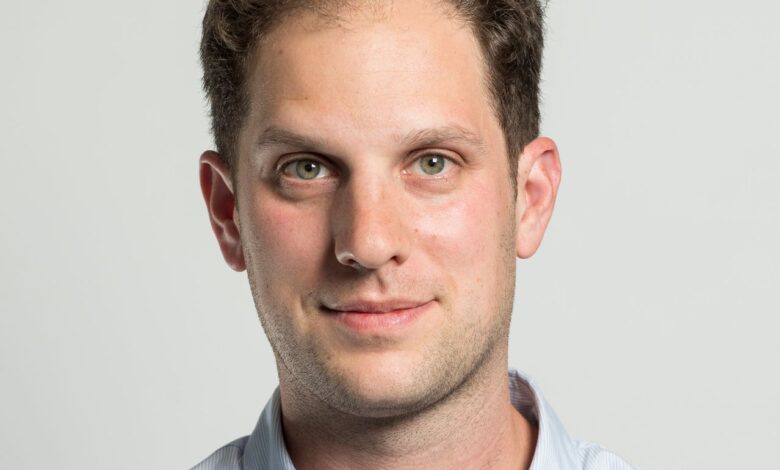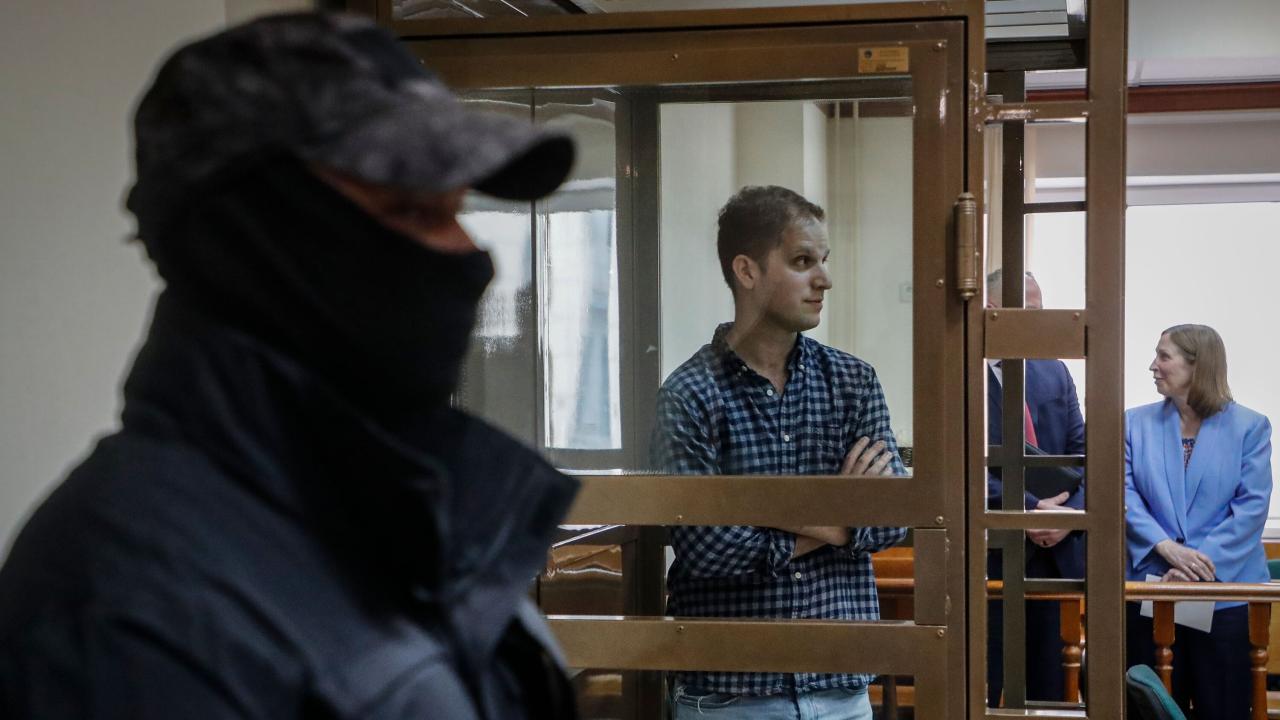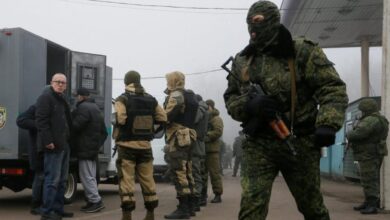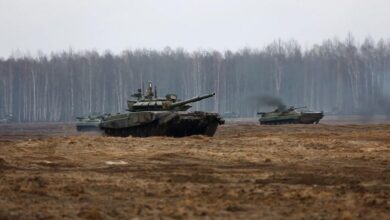
Russia Sentences Evan Gershkovich to 16 Years
Russia sentences Evan Gershkovich to 16 years on bogus spying charges – a shocking verdict that has sent ripples throughout the international community. The Wall Street Journal reporter’s imprisonment, based on flimsy evidence and a deeply flawed legal process, highlights the increasingly hostile environment for journalists operating within Russia and underscores the deteriorating relationship between Moscow and the West.
This case isn’t just about one journalist; it’s a stark reminder of the fragility of press freedom and the lengths authoritarian regimes will go to silence dissent.
The trial, widely condemned as a sham, saw the prosecution present scant evidence, while the defense’s arguments were largely ignored. The international outcry has been swift and severe, with governments and organizations alike voicing their outrage and demanding Gershkovich’s immediate release. The implications for US-Russia relations are significant, potentially further straining already tense ties and jeopardizing any hopes for future cooperation on global issues.
The long-term consequences for journalism and press freedom worldwide are also deeply concerning, creating a chilling effect that could stifle investigative reporting and the free flow of information.
The Case Against Evan Gershkovich
The sentencing of Evan Gershkovich, a Wall Street Journal reporter, to 16 years in a Russian penal colony on espionage charges has sparked international outrage and raised serious questions about press freedom and the rule of law. The trial, widely condemned as a sham by Western governments and human rights organizations, lacked transparency and presented what many see as flimsy evidence against the journalist.
Charges Against Evan Gershkovich
The Russian court charged Gershkovich with espionage, specifically alleging he was acting on behalf of the United States government to collect classified information. The prosecution claimed he was gathering intelligence on the Wagner Group, a Russian private military company, and the mobilization efforts in the Ural region. The severity of the charge carries a potential sentence of up to 20 years, highlighting the gravity of the accusations.
The 16-year sentence handed down to Evan Gershkovich on trumped-up spying charges is a chilling example of Russia’s disregard for international law. It makes you wonder about the motivations of those who willingly fight and die for Putin’s regime, especially considering the article on the foreigners fighting and dying for Vladimir Putin. Gershkovich’s case highlights the risks faced by journalists and the lengths to which the Kremlin will go to silence dissent.
Evidence Presented by the Prosecution
The prosecution’s case largely relied on circumstantial evidence and what many observers consider to be highly dubious claims. They presented alleged intercepted communications, though the content and context of these communications were not made public. Furthermore, they claimed Gershkovich had met with individuals suspected of being linked to intelligence services, though no concrete evidence of espionage activities was presented.
The prosecution’s case rested heavily on the presumption of guilt rather than demonstrable proof.
Defense Arguments and Counter-Evidence
Gershkovich’s defense team vehemently denied all charges, arguing that his journalistic activities were legitimate and that he was simply doing his job reporting on events in Russia. They presented evidence of his journalistic credentials, his past reporting work, and his interactions with sources, all of which were consistent with normal journalistic practices. The defense highlighted the lack of concrete evidence linking Gershkovich to espionage activities, pointing to the absence of classified documents or any proof of intelligence transmission.
They argued that the prosecution’s case was based on conjecture and lacked any credible evidence of criminal intent.
Comparison of Prosecution Claims and Defense Counterarguments
| Claim | Evidence (Prosecution) | Counter-Argument | Evidence (Defense) |
|---|---|---|---|
| Gershkovich was acting as a US spy. | Alleged intercepted communications (content undisclosed), meetings with individuals linked to intelligence services (no proof of espionage). | Gershkovich was conducting legitimate journalistic work. | Gershkovich’s journalistic credentials, past reporting, interactions with sources consistent with normal journalistic practices. |
| Gershkovich gathered classified information on the Wagner Group and mobilization efforts. | Unspecified evidence, relying heavily on circumstantial claims. | Gershkovich’s reporting was based on publicly available information and interviews with open sources. | Evidence of Gershkovich’s reporting methods, lack of access to classified information. |
| Gershkovich intended to harm Russian national security. | No direct evidence of intent or harm presented. | Gershkovich’s actions were consistent with journalistic investigation, not espionage. | Lack of any evidence of intent to harm Russian national security, testimony from colleagues and sources. |
International Reactions to the Verdict
The sentencing of Evan Gershkovich to 16 years in a Russian prison on espionage charges sparked immediate and widespread condemnation from the United States and its allies. The international response highlighted the deep concerns about the rule of law in Russia and the blatant disregard for fundamental human rights. The sheer length of the sentence, coupled with the lack of transparency throughout the trial, fueled the outrage and solidified the perception of a politically motivated prosecution.The severity of the reaction underscores the gravity of the situation, not only for Gershkovich himself but also for the broader implications for press freedom and international relations.
The global community’s response varied in tone and approach, but the core message remained consistent: the conviction was unjust and unacceptable.
United States Government Response
The United States government vehemently denounced the verdict, characterizing it as a grave injustice and a politically motivated sham trial. Secretary of State Antony Blinken called the sentence “outrageous” and “a profound travesty of justice.” The White House issued a statement reiterating its demand for Gershkovich’s immediate release, emphasizing that the charges were baseless and that his detention violated international law.
The US government also reiterated its commitment to securing his release through diplomatic channels, while simultaneously imposing further sanctions on Russia. The official statements consistently highlighted the administration’s unwavering support for Gershkovich and his family.
Responses from Other Western Governments and International Organizations
The European Union, the United Kingdom, Canada, and numerous other Western governments echoed the US condemnation. Statements from these countries universally denounced the trial as unfair and the sentence as excessive. Several governments recalled their ambassadors from Moscow for consultations, signaling their deep displeasure. International organizations, including the UN Human Rights Council and Reporters Without Borders, issued strong statements expressing their alarm and calling for Gershkovich’s immediate release.
The statements often emphasized the chilling effect this case could have on journalists operating in Russia and globally.
Comparison of International Reactions
While the overall condemnation was unified, the specific responses varied in their intensity. Some countries, such as the UK, opted for strong diplomatic measures like ambassador recalls. Others focused more on public statements and sanctions. However, the consensus remained: the verdict was unacceptable, and the Russian government’s actions were a violation of international norms. The level of response often correlated with the country’s existing relationship with Russia and its overall approach to foreign policy.
Countries with stronger ties to Russia might have opted for more measured, albeit still critical, statements.
Key Points of International Condemnation
- The verdict was universally denounced as unjust and politically motivated.
- The trial was widely criticized for its lack of transparency and due process.
- Many governments called for Gershkovich’s immediate and unconditional release.
- Several countries implemented or threatened further sanctions against Russia.
- International organizations highlighted the negative implications for press freedom and human rights.
- The sentence was deemed excessive and disproportionate to the alleged crime.
The Implications for US-Russia Relations

The sentencing of Evan Gershkovich to sixteen years in a Russian prison on espionage charges represents a significant escalation in the already fraught relationship between the United States and Russia. This verdict, widely condemned internationally as politically motivated, will undoubtedly cast a long shadow over any attempts at diplomatic rapprochement and severely hamper cooperation on global issues. The immediate fallout is likely to be significant, with potential for long-term consequences that are difficult to predict with certainty.The verdict severely undermines any ongoing diplomatic efforts between the US and Russia.
Trust, already at a critically low point, has been further eroded. Channels of communication, though still technically open, are likely to become even more strained and less effective. The US government’s response, already marked by strong condemnation, will likely include further sanctions and restrictions on interaction. This could range from limiting diplomatic exchanges to imposing further restrictions on Russian businesses and individuals.
The potential for meaningful dialogue on issues of mutual concern, such as arms control or climate change, is now severely diminished.
The shocking 16-year sentence handed down to Evan Gershkovich in Russia for bogus spying charges highlights the increasingly hostile environment for journalists. It makes you think about resilience in the face of oppression, which reminded me of a fascinating article I read about how communities maintain their spirit, like how African churches are keeping the faith alive abroad , demonstrating the enduring power of belief even amidst hardship.
The injustice against Gershkovich underscores the urgent need for international pressure to secure his release.
Impact on Future Cooperation on Global Issues
The Gershkovich case will likely make future cooperation on global issues significantly more challenging. Joint efforts requiring trust and collaboration, such as combating terrorism, addressing pandemics, or tackling climate change, are now far less likely to materialize. The lack of trust and the heightened tensions will make it difficult to reach agreements, even on issues where both countries share a common interest.
The 16-year sentence handed down to Evan Gershkovich by Russia on trumped-up spying charges is a chilling reminder of the fragility of press freedom. It makes you think about the power of storytelling and the importance of voices like Mohamed Mbougar Sarr’s, whose work offers a powerful counterpoint to such oppression; you should definitely check out this article on why you should read mohamed mbougar sarr to understand why.
Gershkovich’s unjust imprisonment underscores the urgent need for global solidarity in defending journalists and truth.
Past examples of successful US-Russia cooperation, such as the START treaties, serve as a stark reminder of what is now at risk. The current atmosphere makes it extremely improbable that similar agreements can be reached in the near future.
Potential for Further Escalation of Tensions
The potential for further escalation of tensions is considerable. The US is likely to respond with further sanctions and other measures, prompting retaliatory actions from Russia. This could involve a tit-for-tat expulsion of diplomats, further restrictions on trade and travel, or even a heightened military presence in regions of strategic importance to both countries. This cycle of escalation could easily spiral out of control, leading to a further deterioration of relations and increasing the risk of accidental conflict.
The situation bears some resemblance to the Cold War, although the specific dynamics are different. The risk of miscalculation and unintended consequences is high.
A Potential Future Scenario
One possible scenario involves a continued stalemate, with neither side willing to significantly compromise. The US may impose more sanctions, potentially targeting individuals close to the Russian leadership. Russia, in response, might further tighten its grip on detained US citizens, possibly using them as bargaining chips in future negotiations. This scenario could lead to a prolonged period of strained relations, characterized by mutual distrust and limited cooperation.
A second scenario could involve a more direct confrontation, perhaps triggered by an incident in a contested region, leading to a heightened risk of military conflict. This, however, would depend on a number of factors, including the actions of other international actors and the internal political dynamics within both countries.
The Legal Framework and Due Process
The conviction of Evan Gershkovich on espionage charges highlights significant differences between the Russian legal system and those of Western democracies. Understanding the framework within which his trial unfolded is crucial to assessing the fairness and transparency of the process. The opaque nature of the Russian judicial system, particularly in cases involving national security, makes a thorough comparison challenging, but key aspects can be analyzed.The Russian legal system, particularly in espionage cases, operates under a framework that prioritizes state security over individual rights.
Pre-trial detention is common, and access to evidence is often severely limited for the defense. The burden of proof rests heavily on the accused, and the judiciary’s independence is often questioned, especially in politically sensitive cases like Gershkovich’s. The prosecution’s case often relies heavily on classified information, which is rarely, if ever, fully disclosed to the defense.
This inherent secrecy creates an uneven playing field.
Gershkovich’s Access to Legal Counsel and Defense Presentation
While Gershkovich was afforded legal representation, the effectiveness of his defense was severely hampered by the limitations inherent in the Russian system. The restrictions on accessing evidence, coupled with the potential for pressure on legal counsel, raise concerns about the integrity of the defense presented. Reports suggest that his lawyers faced significant challenges in obtaining crucial information and presenting a robust counter-argument to the prosecution’s case.
The closed nature of the proceedings further limited the ability of the defense to challenge the evidence presented.
Comparison with Other Countries’ Legal Systems
The Russian legal process in the Gershkovich case stands in stark contrast to those of many Western democracies. In countries like the United States, the presumption of innocence is paramount, and the prosecution bears the burden of proving guilt beyond a reasonable doubt. Extensive discovery processes ensure both sides have access to relevant evidence. The accused has the right to a fair and public trial, with the opportunity to confront witnesses and present a comprehensive defense.
Independent judiciaries and robust appeals processes provide avenues for redress if errors occur. In contrast, the Russian system, as demonstrated in this case, offers fewer protections for the accused.
Comparative Analysis of Key Legal Process Aspects
| Country | Legal Process Step | Description |
|---|---|---|
| Russia | Pre-Trial Detention | Often lengthy and with limited access to legal counsel or evidence. |
| United States | Pre-Trial Detention | Subject to strict legal standards and judicial oversight, with the right to bail. |
| Russia | Access to Evidence | Severely restricted, often with classified information withheld from the defense. |
| United States | Access to Evidence | Extensive discovery process ensures both sides have access to relevant evidence. |
| Russia | Trial Process | Often closed to the public, with limited opportunity for the defense to challenge evidence. |
| United States | Trial Process | Public trial with the right to confront witnesses and present a comprehensive defense. |
| Russia | Burden of Proof | Heavily rests on the accused. |
| United States | Burden of Proof | Rests on the prosecution to prove guilt beyond a reasonable doubt. |
The Role of Journalism and Press Freedom
The conviction of Evan Gershkovich sends a chilling message to journalists worldwide, particularly those covering sensitive political issues in authoritarian regimes. It underscores the precarious position of reporters who challenge official narratives and expose uncomfortable truths, highlighting the increasingly hostile environment for press freedom in many parts of the globe. The long prison sentence handed down serves as a stark warning, not only to journalists working in Russia, but also to those in countries with similarly restrictive press laws.The implications of this case extend far beyond Gershkovich himself.
It creates a climate of fear that can stifle investigative journalism and limit the public’s access to crucial information. The potential for self-censorship, driven by the fear of similar repercussions, is a significant threat to the free flow of information and the ability of citizens to hold their governments accountable. This case also raises serious questions about the integrity of the Russian judicial system and its commitment to upholding fundamental principles of due process and freedom of the press.
Examples of Journalists Facing Similar Charges
The case of Evan Gershkovich is unfortunately not an isolated incident. Many journalists have faced similar accusations of espionage or treason in Russia and other countries with repressive governments. For example, the imprisonment of several journalists in Turkey under anti-terrorism laws, often based on flimsy evidence, exemplifies the broader trend of governments using legal mechanisms to silence dissent.
Similarly, the targeting of journalists in countries like China, where reporting on sensitive topics like human rights abuses can lead to lengthy prison sentences, demonstrates the global reach of this issue. The consistent pattern of these arrests and convictions points to a deliberate strategy to suppress investigative journalism and control the narrative.
Challenges Faced by Journalists Reporting on Sensitive Political Topics
Journalists covering sensitive political topics face numerous challenges, ranging from threats of violence and intimidation to legal harassment and imprisonment. Gathering information often requires navigating complex legal and political landscapes, where sources may be reluctant to speak for fear of reprisal. In many countries, access to information is deliberately restricted, making independent reporting incredibly difficult. Furthermore, journalists frequently face intense pressure from authorities to self-censor their work, altering or withholding information to avoid negative consequences.
The constant risk of arrest, imprisonment, or worse creates a highly stressful and dangerous working environment.
The Chilling Effect on International Journalism
The Gershkovich verdict casts a long shadow over international journalism. It serves as a stark reminder of the risks involved in reporting from countries with repressive regimes. The fear of similar outcomes is likely to lead to increased self-censorship, with journalists potentially avoiding sensitive topics or altering their reporting to align with official narratives. This, in turn, will limit the public’s access to crucial information, hindering accountability and potentially exacerbating existing political and social problems.
News organizations may also become more hesitant to assign reporters to high-risk locations, further limiting the flow of independent reporting from authoritarian states. The long-term impact on international journalism could be a significant decline in critical coverage of sensitive political topics in countries where press freedom is already under threat.
Potential Outcomes and Next Steps: Russia Sentences Evan Gershkovich To 16 Years On Bogus Spying Charges

The sentencing of Evan Gershkovich to 16 years in a Russian prison leaves little room for optimism, but several avenues remain open for his release. The coming months will be crucial, with a complex interplay of legal challenges, diplomatic pressure, and potentially, prisoner exchanges determining his fate. The lack of transparency in the Russian legal system makes predicting the exact timeline challenging, but certain key steps are likely to unfold.
Avenues for Appeal and Further Legal Action, Russia sentences evan gershkovich to 16 years on bogus spying charges
The Russian legal system offers avenues for appeal, although their effectiveness in cases involving political prisoners is questionable. Gershkovich’s legal team will likely pursue all available appeals, potentially citing violations of due process and the lack of credible evidence. International legal organizations may also get involved, providing support and potentially filing complaints with international courts, though these actions may take considerable time and may not directly lead to immediate release.
The appeal process itself is likely to be lengthy and fraught with bureaucratic hurdles, with little guarantee of success given the political nature of the case. Past cases of similar political imprisonments in Russia show a pattern of protracted legal battles with limited success.
Diplomatic Efforts to Secure Gershkovich’s Release
The US government will undoubtedly continue its intense diplomatic efforts. This could involve high-level negotiations with Russia, potentially involving direct communication between President Biden and President Putin, or through intermediaries. Sanctions and other diplomatic pressure may be applied or increased, though the effectiveness of these tactics remains uncertain given the current state of US-Russia relations. The US may also seek support from international allies, coordinating a united front to pressure Russia for Gershkovich’s release.
This coordinated pressure, mirroring efforts in past cases involving detained US citizens abroad, could potentially influence Russia’s decision-making.
Potential for Prisoner Exchanges
The possibility of a prisoner exchange remains a significant factor. This would involve negotiating the release of Gershkovich in exchange for a Russian citizen held in the US. The success of such an exchange depends on several factors, including identifying a suitable counterpart and reaching a mutually acceptable agreement. Past examples of successful prisoner swaps between the US and Russia, though infrequent, demonstrate that this is a viable path, albeit one requiring complex and sensitive negotiations.
The specific individuals involved in any potential exchange would be kept highly confidential for the sake of negotiation success.
Timeline of Potential Future Developments
Predicting a precise timeline is inherently difficult, but we can Artikel potential milestones. The immediate next step is the appeal process, which could take months or even years. Concurrently, diplomatic efforts will continue, potentially leading to breakthroughs or setbacks. The possibility of a prisoner exchange could emerge at any point, depending on the progress of negotiations. A possible timeline could look like this:
- Months 1-6: Appeal process begins; intense diplomatic efforts continue.
- Months 6-12: Appeal rulings; potential escalation of diplomatic pressure; prisoner exchange negotiations may intensify.
- Months 12-24: Further appeals; potential for stalemate or breakthrough in diplomatic efforts; continued focus on prisoner exchange.
- Beyond 24 months: Continued legal battles, diplomatic pressure, and the possibility of a prolonged standoff.
It is important to note that this is a speculative timeline, and the actual sequence of events could vary significantly.
The sentencing of Evan Gershkovich is more than just a legal case; it’s a symbol of the ongoing struggle between press freedom and authoritarianism. The international community’s response, while strong, needs to translate into concrete action to secure his release and to protect journalists facing similar threats globally. The future remains uncertain, but the fight for Gershkovich’s freedom, and for the principles of a free press, continues.
This case serves as a stark warning, reminding us of the importance of vigilance in defending the fundamental right to a free and independent media.




